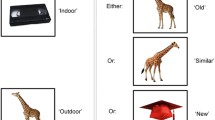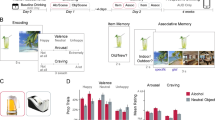Abstract
Rationale
Acute alcohol intoxication induces a selective impairment of recognition memory associated with conscious recollection whilst recognition based on familiarity is left intact.
Objectives
We aimed to further elucidate the acute effects of alcohol on recognition memory by assessing three different doses of alcohol and examining the way in which this affected the recollection and familiarity components of recognition memory in comparison to a placebo group.
Methods
A double-blind independent design was used, and participants received either alcohol (0.4, 0.6 or 0.8 g/kg) or a placebo drink. Participants encoded word pairs with depth of processing manipulated under generate and read conditions. Recognition memory was assessed and recollective awareness was examined through use of the remember–know procedure.
Results
Alcohol produced a dose-dependent reduction in recognition memory associated with recollection, evidenced by decreases in the number of correctly recognised items with ‘remember’ responses compared to placebo. Recognition based on a familiarity, evidenced by ‘know’ responses, showed no differences between groups or pattern of reduction compared to the placebo group. However, a negative correlation was found between recognition based on familiarity and levels of intoxication.
Conclusions
Alcohol-induced impairments in recognition memory occur in a dose-dependent manner, specifically driven by reductions in recognition associated with conscious awareness.

Similar content being viewed by others
References
Abroms BD, Gottlob LR, Fillmore MT (2006) Alcohol effects on inhibitory control of attention: distinguishing between intentional and automatic mechanisms. Psychopharmacology (Berl) 188:324–334
Aggleton JP, Brown MW (1999) Episodic memory, amnesia, and the hippocampal–anterior thalamic axis. Behav Brain Sci 22:425–444
Bisby JA, Brewin CR, Leitz JR, Curran HV (2009) Acute effects of alcohol on the development of intrusive memories. Psychopharmacology (Berl) 204:655–666
Bisby JA, King JA, Brewin CR, Burgess N, Curran HV (submitted) Acute effects of alcohol on intrusive memory development and viewpoint dependence in spatial memory support a dual representation model.
Bishop KI, Curran HV (1995) Psychopharmacological analysis of implicit and explicit memory: a study with lorazepam and the benzodiazepine antagonist flumazenil. Psychopharmacology (Berl) 121:267–278
Brown MW, Aggleton JP (2001) Recognition memory: what are the roles of the perirhinal cortex and hippocampus? Nat Rev Neurosci 2:51–61
Craik FIM, Lockhart RS (1972) Levels of processing: a framework for memory research. J Verbal Learn Verbal Behav 11:671–684
Curran HV, Hildebrandt M (1999) Dissociative effects of alcohol on recollective experience. Conscious Cogn 8:497–509
Curran HV, Gardiner JM, Java RI, Allen D (1993) Effects of lorazepam upon recollective experience in recognition memory. Psychopharmacology (Berl) 110:374–378
Donaldson W (1996) The role of decision processes in remembering and knowing. Mem Cognit 24:523–533
Duka T, Weissenborn R, Dienes Z (2001) State-dependent effects of alcohol on recollective experience, familiarity and awareness of memories. Psychopharmacology (Berl) 153:295–306
Ewing JA (1984) Detecting alcoholism. The CAGE questionnaire. JAMA 252:1905–1907
Gardiner JM (2008) Remembering and knowing. In: Byrne JH (ed) Learning and memory: a comprehensive reference. Academic, Oxford
Gardiner JM, Ramponi C, Richardson-Klavehn A (1998) Experiences of remembering, knowing, and guessing. Conscious Cognit 7:1–26
George S, Rogers R, Duka T (2005) The acute effect of alcohol on decision making in social drinkers. Psychopharmacology 182:160–169
Goodwin DW, Powell B, Bremer D, Hoine H, Stern J (1969) Alcohol and recall: state-dependent effects in man. Science 163:1358–1360
Hashtroudi S, Parker ES, DeLisi LE, Wyatt RJ, Mutter SA (1984) Intact retention in acute alcohol amnesia. J Exp Psychol Learn Mem Cognit 10:156–163
Henson RN, Rugg MD, Shallice T, Josephs O, Dolan RJ (1999) Recollection and familiarity in recognition memory: an event-related functional magnetic resonance imaging study. J Neurosci 19:3962–3972
Hernandez O, Vogel-Sprott M, Huchin-Ramirez T, Ake-Estrada F (2006) Acute dose of alcohol affects cognitive components of reaction time to an omitted stimulus: differences among sensory systems. Psychopharmacology (Berl) 184:75–81
Hetem LAB, Danion JM, Diemunsch P, Brandt C (2000) Effect of a subanesthetic dose of ketamine on memory and conscious awareness in healthy volunteers. Psychopharmacology (Berl) 152:283–288
Huron C, Giersch A, Danion JM (2002) Lorazepam, sedation, and conscious recollection: a dose–response study with healthy volunteers. Int Clin Psychopharmacol 17:19–25
Jacoby LL (1991) A process dissociation framework: separating automatic from intentional uses of memory. J Lang Mem 30:513–541
Kano M, Gyoba J, Kamachi M, Mochizuki H, Hongo M, Yanai K (2003) Low doses of alcohol have a selective effect on the recognition of happy facial expressions. Hum Psychopharmacol 18:131–139
Krystal JH, Petrakis IL, Krupitsky E, Schutz C, Trevisan L, D’Souza DC (2003) NMDA receptor antagonism and the ethanol intoxication signal: from alcoholism risk to pharmacotherapy. Ann NY Acad Sci 1003:176–184
Leitz JR, Morgan CJ, Bisby JA, Rendell PG, Curran HV (2009) Global impairment of prospective memory following acute alcohol. Psychopharmacology (Berl) 205:379–387
Lister RG, Gorenstein C, Fisher-Flowers D, Weingartner HJ, Eckardt MJ (1991) Dissociation of the acute effects of alcohol on implicit and explicit memory processes. Neuropsychologia 29:1205–1212
Mandler G (1980) Recognition: the judgment of previous occurrence. Psychol Rev 87:252–271
Manns JR, Hopkins RO, Reed JM, Kitchener EG, Squire LR (2003) Recognition memory and the human hippocampus. Neuron 37:171–180
Matthews DB, Silvers JR (2004) The use of acute ethanol administration as a tool to investigate multiple memory systems. Neurobiol Learn Mem 82:299–308
Maylor EA, Rabbitt PM, Kingstone A (1987) Effects of alcohol on word categorization and recognition memory. Br J Psychol 78:233–239
Mehrabian A, Russell JA (1978) A questionnaire measure of habitual alcohol use. Psychol Rep 43:803–806
Moore S, Shepherd J, Perham N, Cusens B (2007) The prevalence of alcohol intoxication in the night time economy. Alcohol Alcohol 42:629–634
Parker ES, Tulving E (1983) Picture recognition on the ascending and descending limbs of the blood alcohol curve. Unpublished raw data
Parker ES, Morihisa JM, Wyatt RJ, Schwartz BL, Weingartner H, Stillman RC (1981) The alcohol facilitation effect on memory: a dose-dependent study. Psychopharmacology 74:88–92
Ray S, Bates ME (2006) Acute alcohol effects on repetition priming and word recognition memory with equivalent memory cues. Brain Cogn 60:118–127
Rugg MD, Yonelinas AP (2003) Human recognition memory: a cognitive neuroscience perspective. Trends Cogn Sci 7:313–319
Rugg MD, Fletcher PC, Allan K, Frith CD, Frackowiak RS, Dolan RJ (1998) Neural correlates of memory retrieval during recognition memory and cued recall. NeuroImage 8:262–273
Schweizer TA, Vogel-Sprott M (2008) Alcohol-impaired speed and accuracy of cognitive functions: a review of acute tolerance and recovery of cognitive performance. Exp Clin Psychopharmacol 16:240–250
Schweizer TA, Vogel-Sprott M, Danckert J, Roy EA, Skakum A, Broderick CE (2005) Neuropsychological profile of acute alcohol intoxication during ascending and descending blood alcohol concentrations. Neuropsychopharmacology 31:1301–1309
Soderlund H, Grady CL, Easdon C, Tulving E (2007) Acute effects of alcohol on neural correlates of episodic memory encoding. NeuroImage 35:928–939
Sunram-Lea SI, Dewhurst SA, Foster JK (2008) The effect of glucose administration on the recollection and familiarity components of recognition memory. Biol Psychol 77:69–75
Townshend JM, Duka T (2002) Patterns of alcohol drinking in a population of young social drinkers: a comparison of questionnaire and diary measures. Alcohol Alcohol 37:187–192
Tulving E (1983) Elements of episodic memory. Clarendon, Oxford
Tulving E (1985) How many memory systems are there? Am Psychol 40:385–398
Tulving E, Schacter DL (1990) Priming and human memory systems. Science 247:301–306
Turriziani P, Serra L, Fadda L, Caltagirone C, Carlesimo GA (2008) Recollection and familiarity in hippocampal amnesia. Hippocampus 18:469–480
Weissenborn R, Duka T (2003) Acute alcohol effects on cognitive function in social drinkers: their relationship to drinking habits. Psychopharmacology 165:306–312
White AM, Matthews DB, Best PJ (2000) Ethanol, memory, and hippocampal function: a review of recent findings. Hippocampus 10:88–93
Wixted JT, Squire LR (2004) Recall and recognition are equally impaired in patients with selective hippocampal damage. Cogn Affect Behav Neurosci 4:58–66
Yonelinas AP (2002) The nature of recollection and familiarity: a review of 30 years of research. J Mem Lang 46:441–517
Yonelinas AP, Jacoby LL (1995) Dissociating automatic and controlled processes in a memory-search task: beyond implicit memory. Psychol Res 57:156–165
Yonelinas AP, Kroll NE, Dobbins I, Lazzara M, Knight RT (1998) Recollection and familiarity deficits in amnesia: convergence of remember–know, process dissociation, and receiver operating characteristic data. Neuropsychol 12:323–339
Author information
Authors and Affiliations
Corresponding author
Rights and permissions
About this article
Cite this article
Bisby, J.A., Leitz, J.R., Morgan, C.J.A. et al. Decreases in recollective experience following acute alcohol: a dose–response study. Psychopharmacology 208, 67–74 (2010). https://doi.org/10.1007/s00213-009-1709-y
Received:
Accepted:
Published:
Issue Date:
DOI: https://doi.org/10.1007/s00213-009-1709-y




